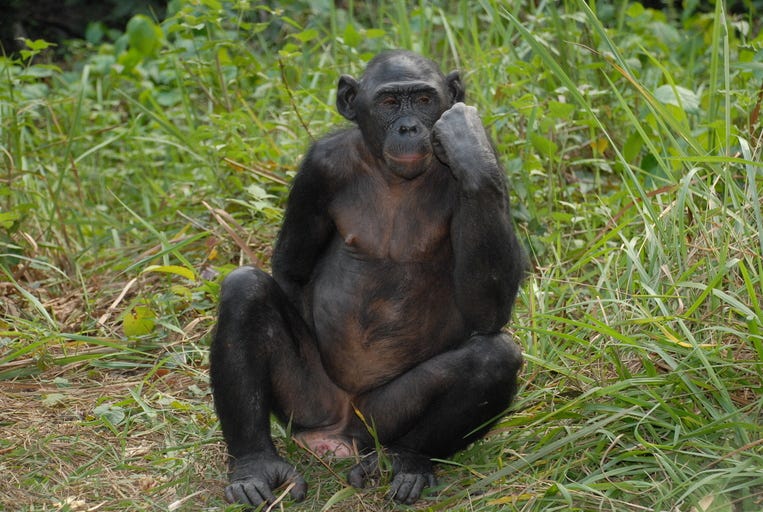# What Primates Teach Us About Politics: Chimpanzees vs. Bonobos
Written on
Understanding Human Cooperation
Human beings stand out for their remarkable ability to collaborate. We've constructed vast technological societies that include millions—even billions—of individuals who are often strangers. However, a recent study published in Science suggests that our uniqueness in cooperation might not be as exceptional as we previously believed. Evidence now points to groups of unrelated bonobos also demonstrating cooperative behaviors.
Chimpanzees, our close relatives, have long exhibited cooperation within their own troops. Male chimpanzees (Pan troglodytes) collaborate during hunts, while females assist each other in raising offspring. Older chimps impart vital skills to younger ones, such as using tools to fish for termites or cracking nuts. Yet, when two unrelated chimpanzee groups meet, their interactions typically result in avoidance or aggression.
Contrastingly, bonobos present a different narrative.
The Bonobo Difference
Once classified as "pygmy chimpanzees," bonobos (Pan paniscus) are recognized as a distinct species. Genetically, they share a similar lineage with us as with chimpanzees, but their behaviors diverge significantly. Unlike territorial chimpanzees, bonobos exhibit cooperative behaviors when different groups encounter one another. Over a two-year study, researchers observed 95 interactions among bonobo tribes, with some lasting only an hour while others continued for days—once even lasting two weeks.
During these interactions, bonobos behaved as if they were part of a single troop. They groomed one another, shared food, and worked together to fend off threats such as snakes.

Chimpanzees vs. Bonobos: Social Structures
Chimpanzee societies are patriarchal, led by an alpha male who maintains dominance through power and cunning. Dominance displays often escalate to violence, especially when two troops overlap in territory rich with resources. Conversely, bonobos have a matriarchal structure, led by an alpha female who fosters a nurturing environment. They do not engage in violent coalitions; rather, they tend to resolve conflicts through sexual behaviors—including homosexual interactions—which serve both reproductive and recreational purposes.
In contrast, chimpanzee killings occur opportunistically, as male groups patrol borders to eliminate isolated rivals. This hunting strategy allows them to expand their territory, claiming food and mates from neighboring troops. On the other hand, bonobos forage in larger groups, minimizing their chances for lethal confrontations.
The Evolution of Political Behavior
Last year, I examined a noteworthy trend in American politics: since the late 1970s, the Republican Party has increasingly attracted male voters, while the Democrats have resonated more with female voters. It’s important to note that many men still support Democrats and many women back Republicans, yet the political divide seems to reflect values that align more closely with one gender or the other.
This hierarchical perspective influences social dynamics. Hierarchical individuals typically lean towards competitive strategies, while egalitarian personalities favor cooperation. Intriguingly, this political behavior mirrors the characteristics of chimpanzees and bonobos: the former reflecting a patriarchal mindset, and the latter embodying egalitarian values.
Democracy in the Primate Kingdom
Humans are often referred to as “the naked ape,” sharing nearly 99% of our DNA with both chimpanzees and bonobos. Like chimps, we display fierce loyalty to our groups and can be cunning in conflict. However, akin to bonobos, we are also capable of forming cooperative relationships with those outside our kinship circles, driven by friendliness and mutual goals.
Human nature oscillates between these two tendencies, the “inner chimp” and the “inner bonobo.” While these traits served our ancestors well, they may not be suitable for today’s challenges. Carl Sagan argued that some aspects of our nature, once adaptive, may now be counterproductive in our current context.
The philosophical debate on whether humans are inherently good or evil has persisted for centuries. Both perspectives hold truth; we are social animals capable of both kindness and cruelty. Our institutions can either cultivate our better qualities or exacerbate our worst traits.
Constructing Better Institutions
Today, we possess vast knowledge regarding our nature and how various social structures affect our behavior. We can design institutions that diminish our inclination toward dominance while enhancing our collaborative instincts.
Some, like Jordan Peterson and Jonathan Haidt, view the alpha figure as a necessary force. While an alpha may bring about order and resolve conflicts, bonobo societies offer an alternative: peaceful conflict resolution without the need for authoritarian hierarchies.
Trumpism epitomizes chimpanzee-like politics, focused on territorial control and security through hierarchies built on force. This approach, however, is fundamentally authoritarian and cannot adapt to broader societal needs.
In contrast, liberalism aligns with bonobo principles, emphasizing democracy, trust, and cooperation. This perspective demonstrates that values such as freedom and equality are not in opposition, but rather reinforce one another.
As we face existential threats like climate change and nuclear proliferation, it's evident that we must lean towards our inner bonobo, fostering collaboration rather than yielding to our inner chimp.
Chapter 2: The Role of Politics in Primate Behavior
In this video, FOX 5 News highlights a press conference where President Biden mistakenly mixed up Vice President Harris and former President Trump, illustrating the complexities of political communication.
This video features Timmons discussing how Trump's leadership style contrasts with Biden's, emphasizing that Trump will not tolerate the same issues faced by Biden, shedding light on differing political philosophies.